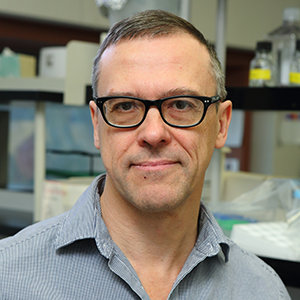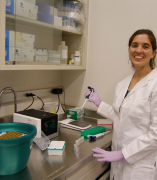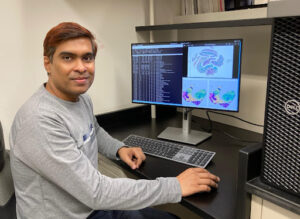Cancer Genomics Shared Resource (CGSR) provides state-of-the-art services for University of Illinois Cancer Center investigators to conduct genomic research on cancer complexity through effective utilization of equipment, scientific knowledge, and technical guidance. We offer technologies, help to design experiments, and interpret data for multidimensional genomic and epigenomic analyses. We provide advice on using other cores at the University of Illinois and other institutions to match the investigator’s needs.
Our Services
Consultation
We offer free consultations to members regarding:
- Developing testable hypotheses based on whole-genome data
- Study design
- Troubleshooting methodological difficulties
- Grant and manuscript support (letters of support, text for grants and manuscripts, etc.)
Education and Training
The faculty associated with CGSR gives presentations on cancer genomics at Cancer Center Program meetings, Working Groups meetings, and at the Center for Bioinformatics and Quantitative Biology. The staff also organizes seminars with various vendors offering.
Direct Services
- scRNA-seq (from fresh tissue or FFPE tissue)
- CITE-seq
- scATAC-seq
- We work closely with DNA Services Core at University of Illinois at Urbana-Champaign for sequencing on Novaseq 6000 flowcell
- Sanger sequencing
- Shotgun DNA sequencing
- Subcloning in a virus vector (adenoviral, lentiviral or retroviral) for gene knockdown, knockout, overexpression, tagging, etc.; preparation of viral supernatants; virus titaration
- Cell line authentication via short tandem repeat analysis
- Mycoplasma testing by PCR to detect contamination in cell cultures
- Transcriptional profiling by RNA-seq (from total RNA, with options including whole transcript total RNA sequencing with ribosomal depletion, mRNA sequencing, miRNA sequencing)
- Gene expression analysis by RT-qPCR
- Library preparation for ChIP-seq, methylation (MeDIP), CRISPR
- Preparing investigators’ raw samples for NGS-based analyses
- “Ready-to-load” service includes quality control and preparation for NGS submission
- Targeted genotyping, cancer mutation panel sequencing and copy number analysis (custom multiplex panes, multiplexed targeted NGS amplicon sequencing-, HT array-based for custom SNP-type assays)
- DNA/RNA extractions from multiple sample types, including FFPE tissue, flash-frozen tissue, RNA-later stored tissue, cell cultures and cell pellets
- DNA/RNA quality control (QC), quality analysis and quantification.
Equipment and Platforms
- Single-cell sequencing
- Chromium X (10xGenomics)
- Sanger (daily) sequencing
- Life Technologies 3730xl Analyzer
- Sample homogenizing
- Bullet Blender
- MP FastPrep-24 5G
- Nucleic acid extraction devices
- Promega Maxwell 16
- Promega Maxwell RSC
- Qiagen QIAcube Nucleic Acid Extraction Robot
- Nucleic acid quality analysis and quantification
- Life Technologies Qubit
- Fluidigm BioMark HD & JUNO
- Agena Bio MassArray System
- NGS devices
- Agilent TapeStation 4200 automated RNA and DNA size selection
- Sage Scientific Blue PippinPrep automated DNA size selection
- Sequencers
- Illumina MiniSeq
- Illumina MiSeq
- NanoDrop One – Thermo Scientific™ Microvolume UV-Vis Spectrophotometer
- Covaris S2 acoustic shearing device
- Life Technologies 7500Fast
- Life Technologies Viia7 – (96-well standard, 96-well fast, and 384-well interchangeable blocks)
Meet Our Team



Maxim Frolov, PhD, Professor

Maria Paula Zappia, PhD, Research Assistant Professor

Seock-Won Youn, PhD, Research Assistant Professor

Khademul Islam, PhD
For projects requiring cell sorting, we navigate the process in collaboration with Flow Cytometry SR.
Protocols
Publications
Principe DR, Aissa AF, Kumar S, Pham TND, Underwood PW, Nair R, Ke R, Rana B, Trevino JG, Munshi HG, Benevolenskaya EV*, Rana A*. Calcium channel blockers potentiate gemcitabine chemotherapy in pancreatic cancer. Proc. Natl. Acad. Sci. USA 2022 119(18): e2200143119. doi: 10.1073/pnas.2200143119. PMCID: PMC9170157. *Co-corresponding authors.
Kopanja D, Chand V, O’Brien E, Mukhopadhyay NK, Zappia MP, Islam ABMMK, Frolov, MV, Merrill BJ, Raychaudhuri P. Transcriptional repression by FoxM1 suppresses tumor differentiation and promotes metastasis of breast cancer. Cancer Res 2022 82(13):2458-2471. doi: 10.1158/0008-5472.CAN-22-0410. PMCID: PMC9258028
Blaha CS, Ramakrishnana G, Jean SM, Nogueira V, Rho H, Kang S, Bhaskar P, Terry AR, Aissa AF, Frolov MV, Patra KC, Robey RB, Hay N. A non-catalytic scaffolding activity of hexokinase 2 contributes to EMT and metastasis. Nat Commun. 2022 Feb 16;13(1):899. doi: 10.1038/s41467-022-28440-3.PMID: 35173161
Aissa AF, Islam ABMMK, Ariss MM, Go CC, Rader AE, Conrardy RD, Gajda AM, Rubio-Perez C, Valyi-Nagy K, Pasquinelli M, Feldman LE, Green SJ, Lopez-Bigas N, Frolov MV, Benevolenskaya EV. Single-cell transcriptional changes associated with drug tolerance and response to combination therapies in cancer. Nat Commun. 2021 Mar 12;12(1):1628. doi: 10.1038/s41467-021-21884-z.PMID: 33712615
Chen X, Ariss MM, Ramakrishnan G, Nogueira V, Blaha C, Putzbach W, Islam ABMMK, Frolov MV, Hay N. Cell-Autonomous versus Systemic Akt Isoform Deletions Uncovered New Roles for Akt1 and Akt2 in Breast Cancer Mol Cell. 2020 Oct 1;80(1):87-101.e5. doi: 10.1016/j.molcel.2020.08.017. Epub 2020 Sep 14.PMID: 32931746
Zappia MP, de Castro L, Ariss MM, Jefferson H, Islam AB, Frolov MV. A cell atlas of adult muscle precursors uncovers early events in fibre-type divergence in Drosophila. EMBO Rep. 2020 Oct 5;21(10):e49555. doi: 10.15252/embr.201949555. Epub 2020 Aug 19.PMID: 32815271

